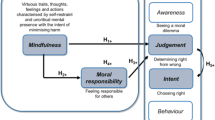Abstract
In his recent paper in Sophia, ‘Theodicy: The Solution to the Problem of Evil, or Part of the Problem?’ Nick Trakakis endorses the position that theodicy, whether intellectually successful or not, is a morally obnoxious enterprise. My aim in this paper is to defend theodicy from this accusation. I concede that God the Creator is a moral monster by human standards and neither to be likened to a loving parent nor imitated. Nonetheless, God is morally perfect. What is abhorrent is not tough-minded theodicy but the hubris of imitating God. I further claim that it is no accident that the same sort of objection is made to act utilitarianism as to tough-minded theodicy if the latter is misinterpreted as implying a guide for human action.
Similar content being viewed by others
Notes
By the experience of X I do not mean, ‘grasping the essence of’ X, but being aware of X (‘intuiting X’ in Kant’s sense) as X appears to us. So there is a sense in which neither the theoretical belief about God nor the experience of God is adequate to its object.
I am indebted to Tony Lynch for a discussion of the difference between pity and compassion. It is not absurd to have compassion for a God who suffers. To pity is to treat the object of pity as in some way inferior. So Christians might have compassion for Christ crucified but not pity.
I do not pretend that my list is complete. See the Stanford Encyclopedia of Philosophy entry on ‘Consequentialism’ for a discussion of such incommensurability.
Here I am assuming it is coherent to maximize expected utility. I am grateful to Arcady Blinov for reminding me that this assumption is controversial.
References
Anscombe, G. E. M. (1957). Does Oxford philosophy corrupt the youth? In G. E. M. Anscombe, M. Anscombe, L. Gormally (Eds.), Human life, action and ethics (pp. 161–168). Exeter: Imprint, 2005, reprinted from The Listener, 57.
Dawkins, R. (2006). The God delusion. London: Bantam.
Jackson, F. (1982). Epiphenomenal Qualia. Philosophical Quarterly, 32, 127–136.
Le Guin, U. (1975). The ones who walk away from Omelas. In U. Le Guin (Ed.), The wind’s four quarters (pp. 275–284). New York: Harper & Row.
O’Connor, T. (2008). Theism and ultimate explanation: the necessary shape of contingency. Oxford: Blackwell.
Phillips, D. Z. (2004). The problem of evil and the problem of God. London: SCM Press.
Plantinga, A. (1974). The nature of necessity. Oxford: Clarendon Press.
Smart, J. J. C. & Williams, B. (1973). Utilitarianism: for and against. Cambridge: Cambridge University Press.
Surin. (1986). Theology and the problem of evil. Oxford: Blackwell.
Swinburne, R. (1996). Is there a God? New York: Oxford University Press.
Trakakis, N. (2008). Theodicy: the solution to the problem of evil, or part of the problem? Sophia, 47, 161–191.
Williams, B. (1995). Making sense of humanity. Cambridge: Cambridge University Press.
Author information
Authors and Affiliations
Corresponding author
Additional information
I am indebted to Tony Lynch and to Nick Trakakis for persuading me to take anti-theodicy seriously, and to those who participated in the discussion when I read a version of this paper to the APRA Conference in Sydney, July 2008.
Rights and permissions
About this article
Cite this article
Forrest, P. Why Richard Swinburne Won’t ‘Rot in Hell’: A Defense of Tough-minded Theodicy. SOPHIA 49, 37–47 (2010). https://doi.org/10.1007/s11841-009-0157-9
Published:
Issue Date:
DOI: https://doi.org/10.1007/s11841-009-0157-9




